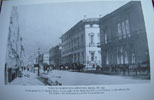The Reform Club
1836-1978 A history from the Club's records by GEORGE WOODBRIDGE With a foreward by MAURICE ASHLEY, C.B.E. Privately printed for Members of the Reform Club in association with Clearwater Publishing Company, Inc., New York and Toronto 1978.
FIRST EDITION. 1978. 250x180mm. 1fep. Half title. Verso with frontispiece - lithograph of London Clubs incl. The Reform. Title page. Verso with ISBN. 2p Forward. 2p Preface and Acknowledgements. 2p Contents and Illustrations. 1-173. [1] 175-178 Bibliography. 179-185 Index. [1] 1fep. With numerous photographs and illustrations in-text, some full page. Fully bound navy blue cloth and gilt writing and tooling on the spine and front cover. With a wine red d/j. All in excellent condition; as new.
- The Reform Club is a gentlemen's club on the south side of Pall Mall (at number 104), in central London. Originally for men only, it has admitted women since 1981. In 1977 its subscription fees were among the highest in London. It was founded in 1836 by Edward Ellice, Whig whip, whose riches came from the bank 'The Hudson's Bay Company', but whose zeal was chiefly devoted to securing the passage of the Reform Act of 1832. The new club, for members of both Houses of Parliament, was meant to be a centre for the radical ideas which that bill represented; a bastion of liberal and progressive thought that became closely associated with the Liberal Party, which had largely succeeded the Whigs by the middle of the 19th century. Until the decline of the Liberal Party, it was de rigueur for Liberal MPs to be members of the Reform Club, which almost constituted another party headquarters, although the National Liberal Club, formed under William Gladstone's chairmanship, was established in 1882, designed to be more "inclusive", and was geared more towards Liberal grandees and activists in the country. The building, like its neighbor the Travellers Club, (number 106), was designed by Sir Charles Barry and opened in 1841. The new club was palatial, the design being based on the Farnese Palace in Rome. The Reform was one of the first clubs to have bedrooms, and its library contains some 75,000 books, mostly political history and biography. The Library was established in 1841, shortly after the Club moved into the newly built clubhouse. A comprehensive collection of parliamentary papers, reports, speeches and reference works was regarded as essential for the many active politicians amongst the early members. But the Library also aimed to achieve a broad coverage in the humanities, in order to serve the Club's more general cultural aims. The Library was formed under the guidance of Sir Anthony Panizzi, a Club member and also the most distinguished librarian of the age; from 1856 to 1866 Panizzi held the post of Principal Librarian to the British Museum, where he is particularly remembered as the designer of the famous circular Reading Room. Another famous aspect of the Club is its association with Alexis Soyer. The flamboyant chef, self-promoter and writer of several important cookery books, became Chef de Cuisine in 1837. He designed the kitchens with Charles Barry at the newly built Club. He instituted many innovations, including cooking with gas, refrigerators cooled by cold water, and ovens with adjustable temperatures. His kitchens were so famous that they were opened for conducted tours. When Queen Victoria was crowned on 28 June 1838, he prepared a breakfast for 2,000 people in the Club. His salary was more than £1,000 a year. His eponymous Lamb Cutlets Reform are still on the menu of this grand institution. During the Great Irish Famine in April 1847, he invented the 'magic stove' and designed a soup kitchen. The Government asked him to go to Ireland to implement his idea. He got indefinite leave from the Club and opened his soup kitchen in Dublin and his 'famine soup' was served to thousands of the poor for free. Soyer resigned from the Reform Club in May 1850. He was succeeded by another famous Victorian cookery-book writer; Charles Elme Francatelli, who went on to serve the club with distinction for seven years. This volume is an interesting history of an important London institution and bastion of the more liberal elements of the British establishment.






click on image to enlarge

Modern category
ref number:
11110